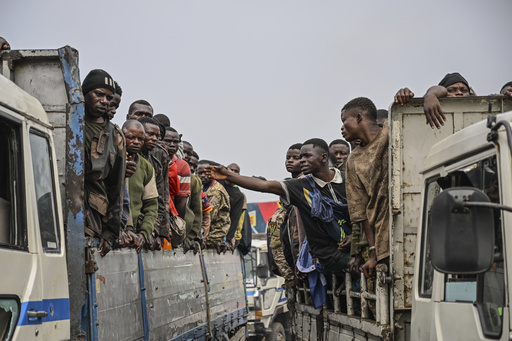
KAMPALA, Uganda — The current offensive by Rwandan-backed rebels in eastern Congo is raising alarms among analysts who fear the violence could escalate into a broader regional conflict involving additional nations. Two neighboring countries, deeply embedded in the mineral-rich region, may play pivotal roles in curbing the ongoing unrest.
The recent capture of Goma by the M23 rebels, alongside their reported advances toward another provincial capital, has sparked concerns from various East and Southern African nations. A meeting of leaders from these regions this past weekend yielded no concrete proposals for a resolution, only a general call for dialogue and an immediate ceasefire. Notably, there was no demand for rebels to vacate Goma.
At the conclusion of the summit, Congo’s government expressed approval for the “foundations for a collective approach” toward achieving peace. However, there is a looming fear that the historically shifting alliances in the area could ultimately lead to a breakdown of unity.
President Felix Tshisekedi of Congo has been seeking support from regional allies since the resurgence of the M23 rebels at the end of 2021. Troops from Burundi—indicative of its strained relationship with Rwanda—were deployed to support Congolese forces. Meanwhile, Tanzanian troops arrived in Congo under a regional bloc’s framework, and Uganda previously sent hundreds of troops to combat a different rebel faction in eastern Congo.
This complex situation is likened to “juggling a polygamous marriage” by Murithi Mutiga, the Africa director at the International Crisis Group, highlighting Tshisekedi’s efforts to safeguard his nation’s territorial integrity. Mutiga pointed out that Rwanda felt sidelined while both Burundi and Uganda were included in Eastern Congo’s military dynamics, prompting Rwanda to assert its influence.
The upsurge of violence has intensified as Congolese officials view the M23 rebels as agents of Rwanda, exploiting the region’s invaluable mineral wealth, which is estimated to be worth trillions of dollars. Reports suggest that approximately 4,000 Rwandan troops are assisting the M23 rebels.
This rebellion is partly fueled by Rwanda’s longstanding concerns regarding other militant groups—primarily ethnic Hutus opposed to the Rwandan government, many of whom are blamed for the 1994 genocide and operate in eastern Congo’s unstable territories. President Paul Kagame of Rwanda has criticized Tshisekedi for neglecting the plight of Congo’s ethnic Tutsis, who have recently faced violent repercussions.
The M23 rebels have set their sights on Bukavu, the capital of South Kivu province, and have declared ambitions to reach Kinshasa, Congo’s far-off capital, positioned roughly 1,600 kilometers (1,000 miles) away.
Historically, eastern Congo has been a persistent conflict zone, culminating in the largest death toll since World War II. Previous regional conflicts erupted in 1998 when then-President Laurent Kabila sought assistance from various countries, including Zimbabwe and Angola, against Rwandan-supported rebels attempting to unseat him.
With Rwanda and Uganda now poised to influence the current conflict, analysts caution about significant risks of escalation. Both Kagame and Ugandan President Yoweri Museveni are keen on maintaining their stakes in eastern Congo, complicating any attempt at peace. The infighting further deepens as Rwanda accuses Uganda of support for rival rebel factions.
Burundi has also been drawn into the fray. It severed ties with Rwanda last year amid accusations of Rwandan support for rebel factions opposing Burundian President Evariste Ndayishimiye. Burundian troops are currently engaged with Congolese forces in eastern Congo. Ndayishimiye has expressed grave concerns, suggesting that Rwanda’s territorial ambitions could extend to Burundi, warning that regional conflict may escalate.
The push for peace remains muddled, with both Rwanda and Congo firm in their positions, making diplomatic resolutions significantly challenging, according to Mutiga. Past peace initiatives have met with limited success, even with a prolonged U.N. peacekeeping presence facing mounting pressures from the Congolese government.
Other entities on the ground include mercenaries, specifically many from Romania, along with personnel from a Southern African regional bloc accused by Kagame of colluding with Congolese military forces rather than serving as neutral peacekeepers.
President Tshisekedi has opted not to engage directly with the M23 and did not attend the recent summit in Tanzania, monitoring it from afar. While welcoming collective efforts to resolve the fighting, his government refuted Rwanda’s explanations regarding the M23’s resurgence, emphasizing that the crisis is primarily an assault on Congo’s sovereignty rather than an ethnic dispute.
With no clear path ahead to resolve the conflict, the situation remains precarious.

